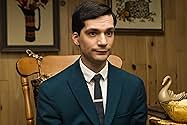As the sisters who raised him have to leave, Henry has to figure out how to live by himself within the city. He finds a job in a lighting shop and claims to "lighten up people's life". His j... Read allAs the sisters who raised him have to leave, Henry has to figure out how to live by himself within the city. He finds a job in a lighting shop and claims to "lighten up people's life". His job will bring him to discover friendship and love.As the sisters who raised him have to leave, Henry has to figure out how to live by himself within the city. He finds a job in a lighting shop and claims to "lighten up people's life". His job will bring him to discover friendship and love.
- Awards
- 2 wins & 12 nominations total
Photos
Victor Andres Turgeon-Trelles
- Henri
- (as Victor Andres Trelles Turgeon)
Catherine De Seve
- Mère d'Henri
- (as Catherine De Sève)
Luc St. Denis
- Gérant cinéma
- (as Luc St-Denis)
- Director
- Writer
- All cast & crew
- Production, box office & more at IMDbPro
Storyline
Did you know
- TriviaDirector Martin Talbot was inspired by a documentary years ago about Place Ville-Marie that included an interview with a guy whose sole job was to replace all the light bulbs in the office tower.
Featured review
Henri is an orphan boy at a convent who, once the convent in Quebec (as countless did and have, in recent history) closes down, must leave the cloister and fend for himself--find work, find love, and find a way to pass on the gift he received there.
Thematically, the film is a long meditation on sight and perception that can branch off through many characters, from the ingenu titular character with a facility for illumination, to the turbanned business owner who can't get his educational credentials recognized, to the blind porn theatre ticket wicket girl who can "read" palms, and on and on. The sentient viewer will enjoy how the impressions and observations regarding viewing build up during the film.
This is a delightful/charmant film. Part of what makes it great is what usually makes great films great--tremendous supporting performances. It's a pity the role of blind Helene wasn't actually played by a blind person, but I guess we're so over that now, cavilling about such things. Oscarssowhite lasted what, 10 minutes? Accuse me of slacktivism, but the film would have been the more powerful, and if you tell me that a sightless person can't act sightful, but only a sightful person can act sightless, well. . . . Major, major opportunity missed, by having a sighted person play a blind one, instead of an actual blind person who gains some sight. (I've still never seen _Philadelphia_, and I'm sure it's a great movie, but if an actual gay person portrayed the protagonist, I'd probably see it; someday we'll get to the point at which you'd actually _lose_ money if you had straights play gays, but I guess that's generations down the road.) For a film that is supposed to challenge and overturn clichés, it does (charmingly), not just that. It tries to fight against its own clichés. But. . .it's 80% great, and the last 20% is so Dickensian/Hugoian and backloaded with clichés, that the film disappoints the eager and committed and devoted viewer; the director, having gone to so much hard work early in the film, completely lets us down and submits to total cliché in the end. It's understandable, since obviously the end was written first, and that's how you usually go about these things. But the huge sag between the early parts, when the director is thinking, and the end, when the director is on auto-pilot, is hugely and dismayingly palpable, especially for a film with such great pacing.
But there's great poetry and earnest effort in this film, still the same. I would like to highlight three excellent features of this film, that you will NOT regret having watched:
1) There's a loving and accurate dedication to accurate scenes here. So perfect and exact is the attention to this detail, that you forget completely that (there being no budget) there are no cars or anything, despite the film being set in Montreal--major triumph here. Anyone, in Quebec, or . . . Poland. . . or anywhere, will get it. Yeah, everything gets too set-piece, but the director employs colour and pacing excellently.
2) There are several comedic scenes, but a few are terrifically set up, and they also pass translation--I know, because, well, I speak both of those languages(and they're the only ones I know well)--so pretty good translations, on the whole, and how many movies have you watched when you just know the translations are off and you get distracted because they are so off?--here's a "foreign" film in which the translations might help and not hinder your enjoyment. If you're going to have comic moments in a sentimental film, you might as well make those comic moments good, and this film makes them great.
3) The soundtrack. Honestly since _Casino_ I cannot remember a film soundtrack having such an impact on me. In _Casino_, it's Scorcese playing the faves of his youth and basically mocking his own self-indulgent film, but here, it's a director actually marrying music to the score of his film and enriching nearly every scene with music, from popular to classical. Outstanding.
My DVD box tells us to buy it because of _Forrest Gump_ comparisons, and I guess those are there. But there is a difference, I think. Normally American studios scout the world over for old ideas they never thought of but can recreate, with money. In this case, a Quebecois director--and let it never not be said that no people, anywhere in North America--allo Police!--are more obsessed with America than the Quebecois--did take a Gumpian story and try to renew and refresh it and in some ways make a copy. Still, (lacking money) rather than simply compare what you just can't compare to, this film actually does extend the narrative and actually build upon other films. For that and for all this movie does, I'd say you wouldn't be disappointed if you saw it.
Thematically, the film is a long meditation on sight and perception that can branch off through many characters, from the ingenu titular character with a facility for illumination, to the turbanned business owner who can't get his educational credentials recognized, to the blind porn theatre ticket wicket girl who can "read" palms, and on and on. The sentient viewer will enjoy how the impressions and observations regarding viewing build up during the film.
This is a delightful/charmant film. Part of what makes it great is what usually makes great films great--tremendous supporting performances. It's a pity the role of blind Helene wasn't actually played by a blind person, but I guess we're so over that now, cavilling about such things. Oscarssowhite lasted what, 10 minutes? Accuse me of slacktivism, but the film would have been the more powerful, and if you tell me that a sightless person can't act sightful, but only a sightful person can act sightless, well. . . . Major, major opportunity missed, by having a sighted person play a blind one, instead of an actual blind person who gains some sight. (I've still never seen _Philadelphia_, and I'm sure it's a great movie, but if an actual gay person portrayed the protagonist, I'd probably see it; someday we'll get to the point at which you'd actually _lose_ money if you had straights play gays, but I guess that's generations down the road.) For a film that is supposed to challenge and overturn clichés, it does (charmingly), not just that. It tries to fight against its own clichés. But. . .it's 80% great, and the last 20% is so Dickensian/Hugoian and backloaded with clichés, that the film disappoints the eager and committed and devoted viewer; the director, having gone to so much hard work early in the film, completely lets us down and submits to total cliché in the end. It's understandable, since obviously the end was written first, and that's how you usually go about these things. But the huge sag between the early parts, when the director is thinking, and the end, when the director is on auto-pilot, is hugely and dismayingly palpable, especially for a film with such great pacing.
But there's great poetry and earnest effort in this film, still the same. I would like to highlight three excellent features of this film, that you will NOT regret having watched:
1) There's a loving and accurate dedication to accurate scenes here. So perfect and exact is the attention to this detail, that you forget completely that (there being no budget) there are no cars or anything, despite the film being set in Montreal--major triumph here. Anyone, in Quebec, or . . . Poland. . . or anywhere, will get it. Yeah, everything gets too set-piece, but the director employs colour and pacing excellently.
2) There are several comedic scenes, but a few are terrifically set up, and they also pass translation--I know, because, well, I speak both of those languages(and they're the only ones I know well)--so pretty good translations, on the whole, and how many movies have you watched when you just know the translations are off and you get distracted because they are so off?--here's a "foreign" film in which the translations might help and not hinder your enjoyment. If you're going to have comic moments in a sentimental film, you might as well make those comic moments good, and this film makes them great.
3) The soundtrack. Honestly since _Casino_ I cannot remember a film soundtrack having such an impact on me. In _Casino_, it's Scorcese playing the faves of his youth and basically mocking his own self-indulgent film, but here, it's a director actually marrying music to the score of his film and enriching nearly every scene with music, from popular to classical. Outstanding.
My DVD box tells us to buy it because of _Forrest Gump_ comparisons, and I guess those are there. But there is a difference, I think. Normally American studios scout the world over for old ideas they never thought of but can recreate, with money. In this case, a Quebecois director--and let it never not be said that no people, anywhere in North America--allo Police!--are more obsessed with America than the Quebecois--did take a Gumpian story and try to renew and refresh it and in some ways make a copy. Still, (lacking money) rather than simply compare what you just can't compare to, this film actually does extend the narrative and actually build upon other films. For that and for all this movie does, I'd say you wouldn't be disappointed if you saw it.
- thelasttwohundredyears
- Mar 17, 2016
- Permalink
Details
- Runtime1 hour 39 minutes
- Color
- Aspect ratio
- 2.35 : 1
Contribute to this page
Suggest an edit or add missing content
































